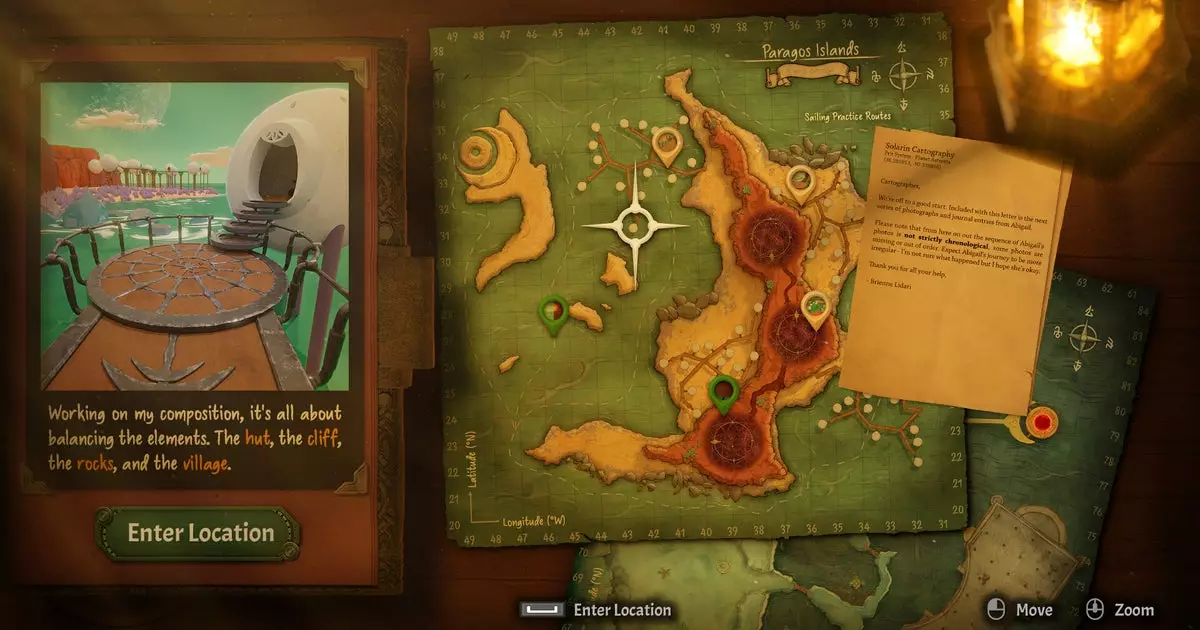In the ever-evolving landscape of indie games, few titles manage to blend stunning visual aesthetics with intriguing gameplay mechanics quite like *Locator*. This detective puzzler propels players into the shoes of an interstellar cartographer, charged with the mission of locating a missing archaeologist, Abigail Lidari, on a mesmerizing alien planet. For fans of atmospheric exploration and engaging puzzles alike, this game offers a unique amalgamation of adventure, deduction, and a touch of whimsy.
At its core, *Locator* invites players to embark on an intricate scavenger hunt, reminiscent of the wildly popular *Geoguessr*. Players are tasked with analyzing a series of photographs and Abigail’s descriptive journal entries to accurately determine her last known location. The delightful twist lies in the game’s charmingly illustrated maps, where players strategically place pins to mark their guesses. After marking three potential sites, players are rewarded—or not—with feedback on their choices, gradually unearthing the full extent of Abigail’s extraterrestrial expedition.
This mechanic evolves from simple landmark recognition to a deeper exploration of the interplay between her observations and the environment. Each puzzle serves as a reflection of the challenge of understanding another’s perspective in an unfamiliar world—a theme that resonates with anyone who has ever felt out of their depth in a new situation.
One of the most compelling aspects of *Locator* is the emotional connection it fosters between the player and Abigail. Through her unique journal annotations and the affectionate nicknames she bestows upon alien structures—such as her whimsically named statues, Milton and Orville—players glean insights about her personality and feelings of isolation. This creative approach not only enriches the narrative but evokes empathy, urging players to step into Abigail’s shoes and view the alien landscape through her eyes.
Moreover, this focus on character allows the game to probe deeper philosophical questions. As players navigate the diverse geographical features and otherworldly architecture, they are reminded of the age-old adage, “the map is not the territory.” Just as maps are mere representations of reality, players must avoid erroneously conflating their discoveries with Abigail’s subjective experiences. This layered narrative encourages contemplation about perception and understanding, a hallmark of thoughtful game design.
*Locator* offers a refreshing take on genre conventions, merging the spatial reasoning found in geography-based games with the logical deduction inspired by detective tales. As players employ various clues—from constellations to flora and fauna—this blend cultivates an intellectual challenge that remains engaging throughout the experience. The Steam page describes this intersection well, highlighting the game’s charming yet cerebral nature.
Though a release date remains elusive, the anticipation for *Locator* continues to grow. With its beautiful artistic style, unique premise, and thoughtful gameplay, it provides an exciting exploration of both alien landscapes and human emotions. As players prepare to traverse these intricate terrains, they can look forward to discovering not just the fate of Abigail Lidari, but also reflections of their understanding and empathy in an expansive universe.


Leave a Reply